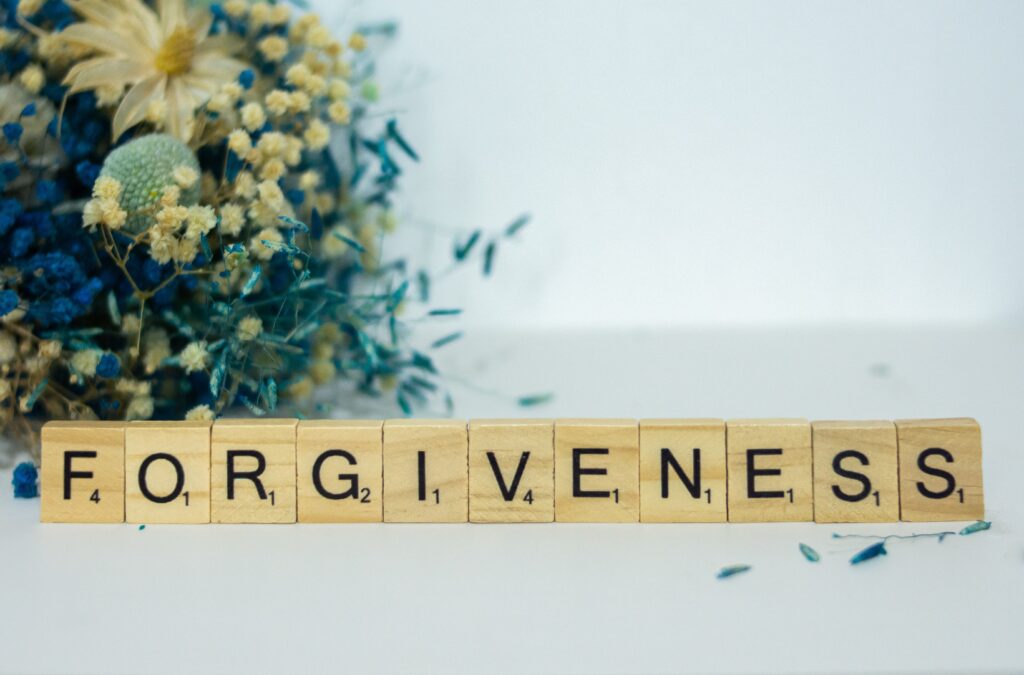Why forgive yourself and forgive others
When someone you care about hurts you, you can hold on to anger and resentment — or embrace forgiveness and move forward.
When you forgive someone, you forgive yourself. Bearing a grudge against someone who has hurt you is not just about what they have done to you. It’s about what you have allowed happening to you.
Forgiving yourself is allowing that you didn’t know, didn’t understand, or didn’t act in a way that could have short-circuited the conflict. When you forgive yourself, you allow resentment and hurt to be replaced by healing. You are taking an action that will course-correct your life and well-being.
Not that long ago I realized that forgiveness is essential to evolve. Although I am still working on it, I have made great progress.
Forgiveness means to identify those hurting feelings and let them go. Cultivating forgiveness will cleanse your feelings of guilt and shame. If you keep harboring those negative emotions, illness might manifest itself.
Forgiveness frees you. It allows you to take your power back. You are no longer chained to an entity that drinks your energy and takes the life out of you. And freeing yourself may allow you to see this person/situation in a whole different light. Instead of focusing on all the negatives, forgiving may allow you to remember all the positives that once were and probably still are.
This article has the goal of convincing the reader to consider forgiveness. The post will include enough information to understand why forgiveness benefits the mind, body, and soul. Ultimately it is up to you to do something about it.
What is forgiveness?
Forgiveness means different things to different people. But in general, it involves intentionally letting go of resentment and anger.
The act that hurt or offended you might always be with you. But working on forgiveness can lessen that act’s grip on you. It can help free you from the control of the person who harmed you. Sometimes, forgiveness might even lead to feelings of understanding, empathy, and compassion for the one who hurt you.
Forgiveness doesn’t mean forgetting or excusing the harm done to you. It also doesn’t necessarily mean making up with the person who caused the harm. Forgiveness brings a kind of peace that allows you to focus on yourself and helps you go on with life.
In short, finding forgiveness is an essential thing to do for your own well-being and for your future health and sanity.
Forgiving gets you out of victim mode. Forgiveness breaks the bonds that tie you negatively to another person. You can forgive while not forgetting. What happened to you happened. No longer a victim, no longer controlled by negative energy, you can focus on becoming stronger, establishing your own integrity, and building your own character so that you know yourself well enough to never allow yourself to be caught in a situation of terrible compromise and pain.
Forgiveness is for our own growth and happiness. When we hold on to hurt, pain, resentment, and anger it harms us far more than it harms the offender.
Forgiveness frees us to live in the present. Reliving the wrong that was done to us keeps us living in the past and missing today’s beauty. Forgiveness lets us regain our personal power.
8 Reasons to Forgive
Practicing forgiveness points to at least eight positive developments.
- To become emotionally healthier. Forgiving can reduce unhealthy anger.
- To repair relationships as it helps me to see the other’s worth.
- To grow in character because it can help me to become a better person.
- To be of assistance, within reason, toward the one who acted unjustly.
- To help me to assist other family members to see that forgiveness is a path to peace.
- To motivate me to contribute to a better world as anger does not dominate.
- To help me to more consistently live out my own philosophy of life or faith tradition if that worldview honors forgiveness.
- To exercise goodness as an end in and of itself regardless of how
How do I move toward a state of forgiveness?
Forgiveness is a commitment to change. It takes practice. To move toward forgiveness, you might:
- Recognize the value of forgiveness and how it can improve your life.
- Identify what needs healing and whom you want to forgive.
- Join a support group or see a counselor.
- Acknowledge your emotions about the harm done to you, recognize how those emotions affect your behavior and work to release them.
- Choose to forgive the person who has offended you.
- Release the control and power that the offending person and situation have had in your life.
- Be aware that forgiveness is a process. Even small hurts may need to be revisited and forgiven again and again.
Why is Forgiveness Important?
Maya Angelou called it “one of the greatest gifts you can give yourself” while Gandhi named it “the attribute of the strong.” For centuries, great minds and artists have sung the praises of the practice of forgiveness, and now science seems to have caught up with what the soulful have long suspected: forgiveness is good for us. It is an act of love and strength – a gift from which no one benefits more than ourselves.
The personal rewards of forgiveness include reducing anger, hurt, depression, and stress, while increasing feelings of optimism, hope, and compassion.
Learning to forgive helps us to control our story and our feelings to avoid unnecessary pain. As powerful individuals, we can choose between living in a victim mode or an adult mode. In the latter state, we acknowledge and feel the full pain of what happened to us without getting stuck in a triggered state in which we feel it is still happening. We can feel our feelings without letting them overtake us.
The Relationship Between Forgiveness and Healing
Studies show that being an object of transgression can be a significant cause for developing depression and that practicing forgiveness can alleviate feelings of anger, avoidance, and vengefulness that lead to negative consequences in one’s emotional and physical health.
Cultivating forgiveness as a means for neutralizing anger and resentment can be a form of coping strategy, while the deliberate replacement of negative feelings with positive emotions can become a form of personal transformation that can lead to emotional healing.
Forgiving responses like developing feelings of empathy and granting forgiveness can reduce arousal, negative emotions, and stress responses.
Other studies found forgiveness to be positively associated with five measures of health:
- physical symptoms,
- medications used,
- sleep quality,
- fatigue
Letting go of negative emotions can often have a remarkable impact on the body.
The Value of Forgiving Yourself
Being kind to yourself and forgiving your own shortcomings can give us a much-needed perspective on the suffering and imperfections of others.
Self-forgiveness has been defined as “a willingness to abandon self-resentment in the face of one’s acknowledged objective wrong, while fostering compassion, generosity, and love toward oneself” (Enright, 1996, p. According to Enright and Fitzgibbons (2015), self-forgiveness entails releasing negative emotions directed at oneself and involves a meaningful interpretation and successful resolution of negative emotions or attitudes directed at oneself.
We can examine self-forgiveness in its many facets:
- a response to guilt and shame
- a step toward processing transgressions
- a means of reducing anxiety
Self-forgiveness as an applied discipline relates to diverse psychosocial contexts such as:
- addiction and recovery,
- couples and families,
- healthy aging,
- the workplace, and
- the military.
Self-forgiveness is an integrative process within a person in which the self that committed the wrongdoing is acknowledged, accepted, and provided the opportunity to move forward.
If you are distressed by anything external, the pain is not due to the thing itself, but to your estimate of it; and this you have the power to revoke at any moment.
Marcus Aurelius
Gratitude and Forgiveness
Practicing gratitude has been consistently linked to greater well-being in a study done by Emmons and McCullough, where it was measured by mood, coping behaviors, health behaviors, physical symptoms, and overall life satisfaction appraisals (Emmons & McCullough, 2003).
Gratitude (more on that in my gratitude post) was found to improve overall life satisfaction and increased feelings of optimism about the future, at least in the short term.
Emmons and McCullough speculated that emotional and interpersonal benefits may be a result of a conscious focus on blessings. Intense gratitude practice increased prosocial behavior and empathy as the subjects’ reported instances of helping others (Emmons & McCullough, 2003).
Since gratitude has been linked to empathy and empathy was found to have implications for forgiveness, there is potential that fostering gratitude could improve one’s capacity toward forgiveness.
As gratitude can be other-focused, this would imply that it can enhance a sense of greater connectedness to others, which in turn can lead to compassion and empathy, and down the road can create a fertile ground for cultivating forgiveness.
Focusing on what one has versus what is missing can make all the difference, both in appreciation of what is as well as a form of coping.
Final Thoughts
The value and benefits of practicing forgiveness are evident and start with us. Self-forgiveness is an important aspect of one’s ability to forgive others and can be a gateway to living a more fulfilled and loving life.
To forgive does not mean that you condone wrongdoing. Forgiving does not mean you have to forget. Forgiveness is eliminating the negativity that results from hurt by letting go of emotional baggage.
Forgiving helps you move forward on your spiritual path. Forgiveness encourages compassion. You can relate to others as part of the human experience. You feel for others as you do for yourself. Emotionally and psychologically free, you can begin to put the past behind you. Forgiveness is an act of kindness and goodness. It is a path to peace. Do it for yourself!

